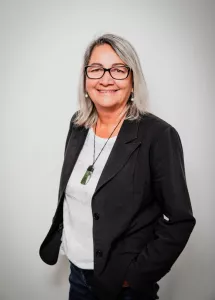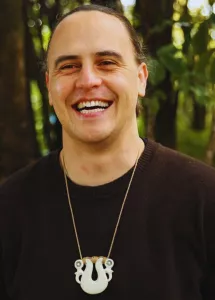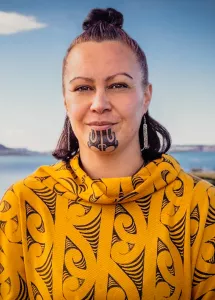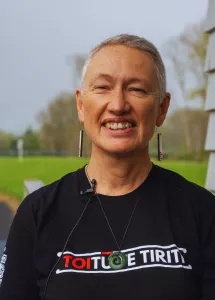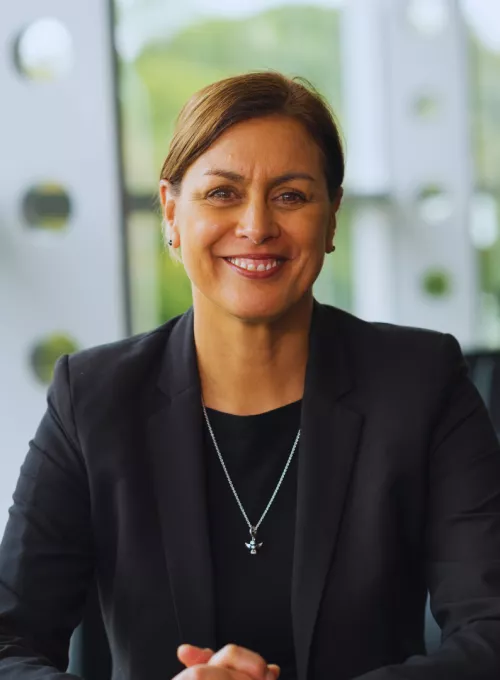
MA, PhD, PGDipEdDEvPsych, MNZPsS
Professor Suzanne Pitama is an esteemed educational psychologist, researcher, and leader in Māori health education. Her mahi is driven by a relentless pursuit of equity in healthcare, ensuring Māori health perspectives are embedded within medical training, research, and practice. In 2022, she made history as the first wahine Māori appointed as the Dean of the Christchurch campus of the University of Otago. In 2025 Suzanne became the Dean of Otago Medical School.
Her academic and professional journey reflects a lifelong commitment to decolonising medical education, ensuring hauora Māori is central to teaching, research, and healthcare delivery. Suzanne’s educational journey has been shaped by an unwavering dedication to kaupapa Māori research and health education:
- Bachelor & Master of Arts in Psychology (University of Auckland) – A foundation in mental health and Māori psychology.
- Postgraduate Diploma in Educational Psychology (Massey University) – Specialising in Māori mental health and child development.
- PhD in Indigenous Medical Education (University of Otago) “As natural as learning pathology": the design, implementation and impact of indigenous health curricula within medical schools. “
Suzanne has played a pivotal role in reforming medical education, holding key leadership positions:
- Dean and Head of Campus, Otago Medical School (2025–Present)
- Dean of Christchurch Campus (2022–2025) – First Māori Dean of a medical school campus in Aotearoa.
- Director, Māori/Indigenous Health Institute (MIHI), Otago University – Leading Indigenous health research and education initiatives.
- Associate Dean Māori, University of Otago Christchurch – Driving institutional change for Māori medical students and researchers.
- Hauora Māori representative, Otago Medical School Curriculum Committee - Ensuring cultural competency is integrated into medical training.
Suzanne co-developed the Hui Process and Meihana Model, now widely used across Aotearoa’s medical and health professional training programmes.
- Hui Process – A structured four-step approach incorporating engagement and relationship building principles of Te Ao Māori into clinical interactions, improving health outcomes for Māori patients.
- Meihana Model – An extension of Sir Mason Durie’s Te Whare Tapa Whā model, integrating Māori perspectives into patient assessment, care, and treatment.
Her innovative frameworks are now embedded in medical, nursing, psychology, occupational therapy, speech therapy, and paramedic training.
Suzanne has been instrumental in Māori health research, serving in key governance roles:
- Chair, Health Research Council Māori Health Committee
- Inaugural Chair, Australian Medical Council Aboriginal, Torres Strait Islander & Māori Standing Committee
- Leaders in Indigenous Medical Education (LIME) Network Reference Group member
- Medical Council of New Zealand Advisor, developing pre-vocational and vocational accreditation standards
- Advisor, Medical School Accreditation processes, both as an internal leader at the University of Otago and as an external assessor in Australia.
Her research spans Māori mental health, cardiovascular disease, health inequities, and systemic racism in healthcare. She has led studies highlighting:
- Ethnic bias in medical assessments
- Healthcare access barriers for Māori patients
- Mental health disparities among Māori youth and whānau
Suzanne’s contributions to Māori health education, research, and governance have been recognised with prestigious awards:
- Prime Minister’s Supreme Award for Tertiary Teaching Excellence (2015)
- Dame Joan Metge Medal (2018) – For excellence in social science research.
- New Zealand Psychological Society Dame Marie Clay Award (2023) ‘for valuable contributions to educational and developmental psychology through original research, the dissemination of research, or best practice’
- LIME Life Award (2024) The inaugural LIME Life awards recognise the significant and outstanding work made by LIME Network Reference Group Members over the past 18 years to form an international community of practice between Indigenous medical educators and non-Indigenous medical educators teaching Indigenous content.
With Ngāti Kahungunu and Ngāti Whare whakapapa, Suzanne’s passion for Māori health equity stems from her own whānau values of manaakitanga and education. Raised between Nūhaka and Wairoa, she was influenced by her parents’ dedication to fostering tamariki—a foundation that shaped her commitment to whānau-centred health.
Suzanne continues to inspire and mentor the next generation of Māori medical professionals, ensuring that hauora Māori remains at the forefront of Aotearoa’s healthcare system.
”My journey has equipped me with a strategic vision for the future of medical education, and an understanding of the unique challenges and opportunities within medical education and research, particularly in relation to Indigenous health, social justice and equity.” – Dr Suzanne Pitama
Links:
E Tangata Article: Suzanne Pitama: Part of a turning tide 11 September 2022
Dean of Otago Medical School—a landmark moment in Aotearoa’s medical education history. Waatea news com – audio interview (6:50) 10 February 2025
University of Otago Profile – Suzanne Pitama includes publications
Wikipedia – Suzanne Pitama Profile
ResearchGate Profile: Suzanne G Pitama
Google Scholar Profile Suzanne Pitama
‘A strong role model': Pitama new dean of Chch med school. Otago Star News Article 20 December 2021
The New Zealand Medical Journal| Journal of the New Zealand Medical Association. Medical education to improve Māori health NZMJ 11 June 2010, Vol 123 No 1316 (pp113-122)
Ka Pū Te Ruha, Ka Hao Te Rangatahi. The Sir George Adlington Syme Oration to the Royal Australasian College of Surgeons. 28 August 2024
27 May 2025
